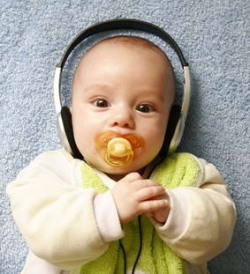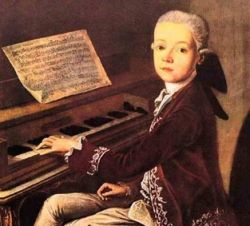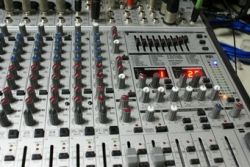Classical Music for Children and Kids

Classical Music for Children
Children have always had a completely different perception of the world. And let's forgive them some minor attitude - the understanding of everything doesn't come at once. It refers to understanding of the classical music as well. We, as parents, should be patient and understanding ourselves, if we truly want to bring up children with a wonderful taste of music. And there is good news on this side - to initiate your kid into the world of classical music is quite easy! How so? Let's see.

The Early Start
Why Do Newly Born Children Need Mozart?
Indeed, why? It often seems to me that most people at some subconscious level realize that Mozart music is the most ‘suitable’ kind of music for babies. And they sense it right – music of this great composer is advised to be listened to already during pregnancy, then after birth, and later on too, of course. The idea is the following. Newly born baby is a pure creation of nature that is genius by its essence. Correspondingly, its creation is genius as well. This is perfection itself. And only with time and under the influence of the society the genius starts dissolving in the surrounding environment, sometimes fully disappearing already somewhere in the childhood.
Mozart himself represents the rare case when such genius was preserved. And maybe that is the reason why he manages to pass that sacred ability through his music to children.
Think about it – little babies haven’t read any newspapers yet, not have they listened to news, nor have they watched TV. All they hear is wonderful music that brings them harmony and piece. This music makes the world ‘out there’ seem less aggressive, less cruel and more understandable.

He Doesn't Carry a Tune?
Develop a Perfect Ear!
It goes without saying that ear for music should be developed. But we need to define the notions first, in order to proceed with methods. Basically, one can speak of two different 'ears', when talking about music. First of all, there is "exquisite ear for music", and there is "relative ear for music" as well. So what is the difference?
Every note in music is in its essence a sound of a certain frequency. For instance, a 440 Hz signal refers to the "A" note of the first octave. So, considering that, exquisite ear for music would mean the ability to unequivocally define the note by its sounding. As soon as you hear 440 Hz - you say "Oh! That's the 'A' note!". Even knowing that the sound may have a very complicated structure, you will still be able to distinguish the 'A' from all the signals. And relative ear for music signifies an ability to define notes by comparison with others, after measuring the ratio between them. So to define that 'A' a person with relative ear for music would have to listen to another note close to 'A'.
A person with relative ear for music cannot tune the guitar correctly, without additional equipment like tuning fork. And the majority of people in fact belong to this group. Moreover, most of them think that a 'relative ear' is an inborn thing, which prevents them from trying to develop it. 'I can't carry a tune - and I'm ok with it'. However, developing if an exquisite ear for music is possible, and it would provide a person with broad opportunities for self-conceptualization in music - both like a professional and an amateur. Besides, the very procedure of studying music would turn from boring cramming into an exciting activity bringing pleasure.
Developing an exquisite ear for music may engender most useful consequences. It would enhance individual abilities of music perception. Such a person would hear much more than he used to hear, he/she would get aesthetic pleasure from music that earlier seemed monotonous to him/her. Why so? Because having developed an exquisite ear for music you also develop other types of hearing, which eventually leads to your overall development music taste.
To cite a simple example: if your child heard some composition on the radio that he liked a lot, try finding that piece of music in a really high quality so that your kid could listen to it again, but this time perceiving every note in its best sounding. Ask the child if he/she felt any difference, and you'll be surprised to find out how much new things would be found in the same piece of music. And in general, try to listen to music, whether it's classical not, in the best quality, that is how ear for music should be developed too.
Many people don't fix too much attention on music for the two simple reasons - either no ear for music or no voice. However, there are methods for EVERYONE to solve these problems. And there are a number of techniques of how to do that in the most effective way for each person. Some of them are based on associations and images, others - rather on the technical side of the matter (I'll try to tell about them in a separate lens). But the point is that the idea of having no tune for music is definitely a myth.

How-What-Why-Where to Teach?
Those are probably the basic questions asked before starting anything. So let’s give answers.
Who to teach – everyone, of course. Including children who do not seem to demonstrate any musical talent or skill at all.
Why to teach – either to create a professional musician (a small percentage) or bringing up an educated and well-prepared amateur, which is what are referring to in most cases.
What to teach – basically two main things should be taught: attentive and literate reading of sheet music and its understanding, and the techniques that allow applying knowledge in practice on a certain music instrument.
Aims of learning music – to draw child’s interest in music, to make the lessons fascinating, to develop children’s creative abilities and to give general idea about the theory of music.
Where to teach – of course, any hint of professional teaching would be a big bonus, even if it is a permanent activity. However, parents should try getting absorbed in the world of music TOGETHER with their offspring, even by simple listening to classical music in their spare time spent together. Oh, and attending any classical concerts is probably the best option.

What If Children Do not Want to Learn ?
Sometimes parents can allow some indulging. But make sure you don’t abuse it. Otherwise, it may lead to caprices and laziness. If you simply try to tear your kid away from computer and other toys – it will not yield any results. Neither will punishment do. So what should be done?
First of all, never try to force the kid, particularly if he/she is having hysterics. Let the kid calm down and the teaching will go on. And of course, don’t overdo with the length of the studies. It’s hard to hold a child’s attention and concentration for too long, so all that’s beyond the time when the interest is lost is simply in vain. Try increasing the time of the lesson gradually, before the child gets used to it.
One of the commonly spread mistakes of teaching music is ‘exchanging’ a lesson for a candy or a small present. The kid should be motivated by the pleasure of the very procedure, not by material things that have nothing to do with music itself.
Music with Love and Interest
Recently, in 2010 there was a special campaign held in London, under the name of “Play me, I’m yours”. The idea was really simple – to give people an opportunity to play the piano and spread the love for it among the citizens. Thus, dozens of pianos were scattered around the city in the most crowded places so that absolutely anyone could try – young or old, professional or amateur, lover or hater. You could just come up to the instrument, sit down and touch the keyboard!
Events like this do make it possible for people to arrive at liking such music. All that is explored by a person him-/herself is more likely to stay within that person and probably give birth to something more powerful. Like passion for music.
Do you ever turn on classical music for your children?
Sheet Music Resources
- Violin Sheet Music
A collection of downloadable violin sheet music in PDF format. - Piano Sheet Music
Download classical and contemporary sheet music for piano.



